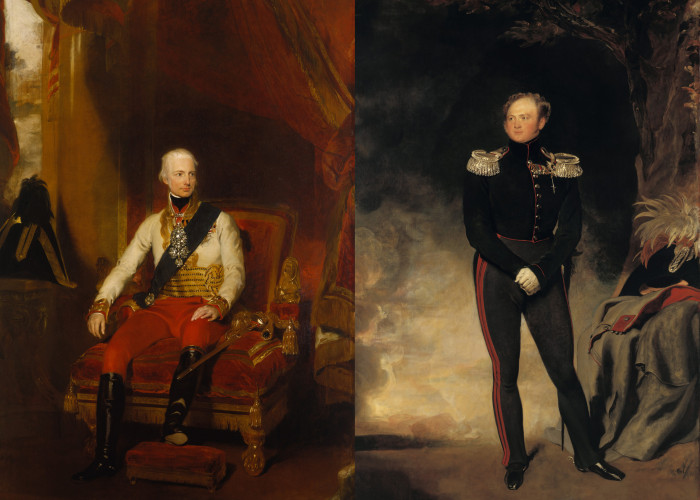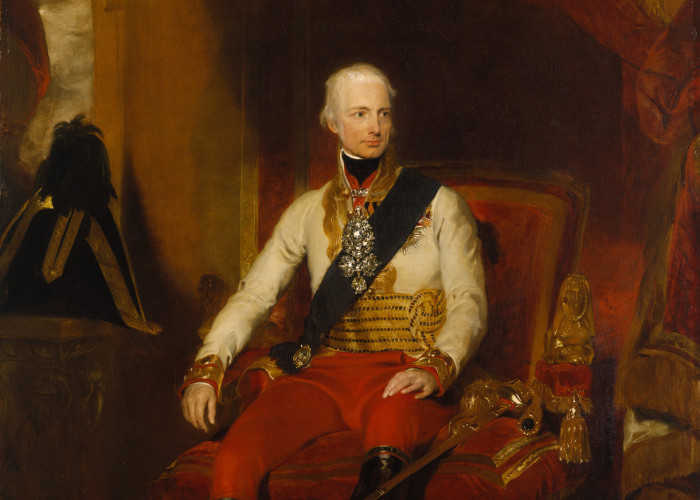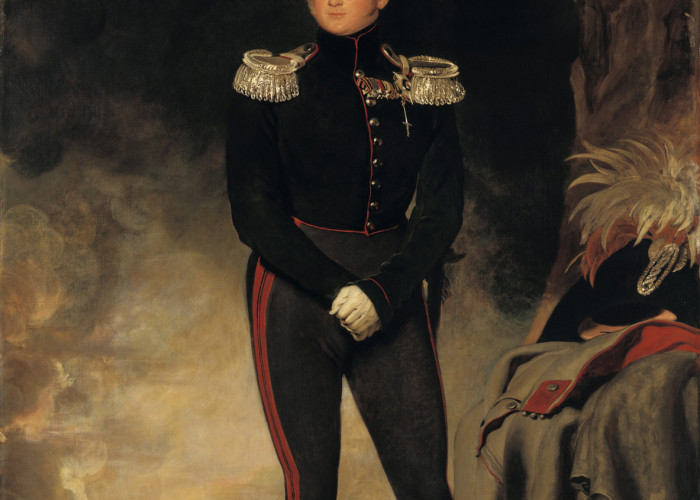Paintings of Allied Monarchs in the Waterloo Chamber, Windsor

 Francis I, Emperor of Austria (1768-1835). Royal Collection Trust/© Her Majesty Queen Elizabeth II 2015
Francis I, Emperor of Austria (1768-1835). Royal Collection Trust/© Her Majesty Queen Elizabeth II 2015
 Alexander I, Emperor of Russia (1777-1825). Royal Collection Trust/© Her Majesty Queen Elizabeth II 2015
Alexander I, Emperor of Russia (1777-1825). Royal Collection Trust/© Her Majesty Queen Elizabeth II 2015
These paintings are of Francis I, Emperor of Austria (left) and Alexander I, Emperor of Russia (right). Waterloo was an allied victory, with Dutch, Belgian, and German troops fighting alongside the British. However, the Napoleonic Wars as a whole were fought by a series of coalitions, and the role of Austria and Russia in particular should not be neglected. The inclusion of Sir Thomas Lawrence’s portraits of these two allied rulers in Windsor Castle’s Waterloo Chamber reflects the importance of their part in the struggle.
Born in 1768, Francis became ruler of the Habsburg dominions in 1792 upon the early death of his father. As such, he oversaw Austrian opposition to France throughout the Revolutionary and Napoleonic Wars, taking to the field in person at Austerlitz and Leipzig, although never directly commanding his troops. Francis was crowned as Holy Roman Emperor with the regnal number Francis II, but was obliged to abdicate this title in 1806 following his defeat by Napoleon at Austerlitz the previous year. Thereafter he ruled as Emperor Francis I of Austria. More defeats followed in 1809, and he was forced to marry his daughter to Napoleon, while Austrian troops sent to aid in the French invasion of Russia. However, Austria re-joined the allies in 1813, and played a central role in the final battles. In 1815, Austrian troops were active in Italy and a large Austrian army was assembling on the upper Rhine to support Blücher and Wellington. Francis, who had held his diverse empire together throughout a bloody conflict, died of a fever in 1835.
Alexander I of Russia came to his throne in 1801 after the murder of his father, Paul I, who had pursued an erratic policy that had lately seen reconciliation with the French. Alexander, however, was violently opposed to Napoleonic expansionism. Unfortunately, in 1805 and 1806-07 Russian armies were too late into the field to help Austria and Prussia, arriving on each occasion only to join in the eventual defeat of the Third and Fourth Coalitions. After 1807, Alexander was forced to agree an uneasy alliance with France, but growing tensions led to renewed war and the French invasion of 1812. Russia emerged victorious from the ordeal, and at Alexander’s insistence kept her armies in the field for the rest of the war. In 1815, Russian troops formed a reserve army in Germany but saw no action. Increasingly reactionary and influenced by religion in the later years of his reign, Alexander died in 1825.
-
Education overview
Sources:
British Monarchy webpage on the Waterloo Chamber: http://www.royal.gov.uk/TheRoyalResidences/WindsorCastle/VirtualRooms/TheWaterlooChamber.aspx
Royal Collection Page on the Franz I portrait: http://www.royalcollection.org.uk/collection/404943/francis-i-emperor-of-austria-1768-1835
Royal Collection Page on the Alexander I portrait: http://www.royalcollection.org.uk/collection/404942/alexander-i-emperor-of-russia-1777-1825
-
Curatorial info
- Originating Museum: Royal Collection Trust
- Accession Number: 404942/404943
- Production Date: 1814-1819
- Creator: Sir Thomas Lawrence (1769-1830)
- Technique: Oil painting
- Size: 273.8 x 179.5 cm/270.5 x 178.4 cm
-
Use this image
You can download and use the high resolution image for use in a non-profit environment such as a school or college, but please take note of the license type and rights holder information below
- Rights Holder: Royal Collection Trust/© Her Majesty Queen Elizabeth II 2015
- License Type: All Rights Reserved
Find it here
This object is in the collection of Windsor Castle








